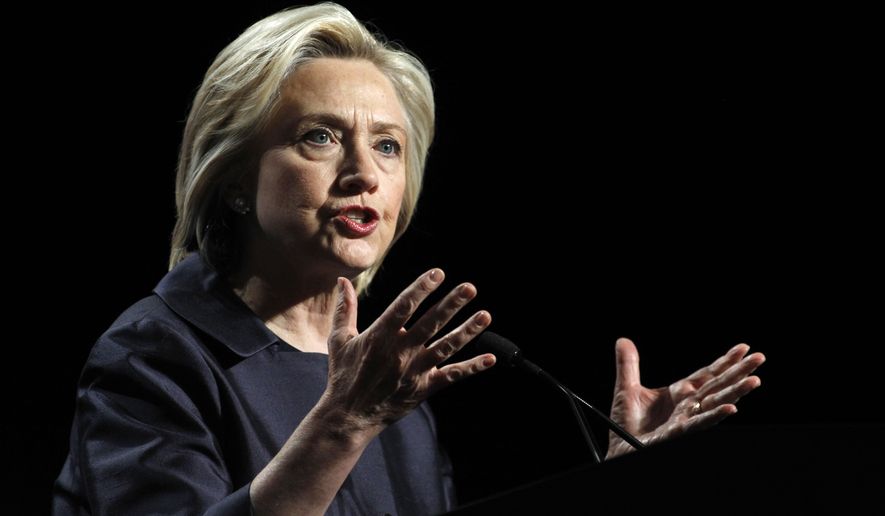The president of a conservative watchdog group says now that it is known that classified information was contained in Hillary Rodham Clinton’s private stash of State Department emails, it is time for the government to seize her personal server and related storage disks to determine whether security was breached during her tenure as secretary of state.
Thomas Fitton, who runs Judicial Watch, has filed, along with other groups, lawsuits to force the State Department to turn over memos and emails. These include Mrs. Clinton’s messages stored on her private, at-home server through which she exclusively conducted government business. A State Department official told a Senate committee this year that her practice was “not acceptable.”
U.S. guidelines are in place for the government to examine computer components that housed classified data without authorization.
Judicial Watch filed a lawsuit in May against Secretary of State John F. Kerry in an effort to have a federal judge order the government to seize Mrs. Clinton’s emails. With last week’s disclosure of classified material being contained in her messages, the watchdog group says its case is stronger.
“It dramatically undermines the defense both from the State Department and Mrs. Clinton that this is not really a big deal,” Mr. Fitton told The Washington Times. “The presumption was there was classified information and that turned out to be the case. And Mrs. Clinton’s denial that there’s classified material — she knew better. Of course there would have been classified material there. And the State Department’s explanation, ‘Oh well, we classified stuff after the fact all the time. There’s nothing unusual there.’ That is baloney. It’s not what the rules are.”
Mrs. Clinton turned over to the State Department 55,000 pages containing some 30,000 emails from a larger collection. The remaining emails were deleted from her server, she said.
The State Department now is making the 30,000 emails public in tranches under orders from a federal judge in a Freedom of Information Act request.
State released 3,000 pages last week and disclosed in the process that 25 emails were redacted because they contained information that reviewers deem classified. Spokesman John Kirby declined to characterize the secret information in any way.
It is not known whether subsequent tranches will include emails that have redacted because of classified information.
“It makes our litigation all the more important for either a court to try to retrieve that server [or] State and other authorities doing what they need to do to secure it,” Mr. Fitton said.
Said Alec Gerlach, a State Department spokesman: “In this production, portions of 25 emails were subsequently upgraded. However, these emails were not classified at the time they were sent. The department takes steps to properly protect documents after they are upgraded. We have provided former Secretary Clinton’s team with instructions about how to handle the documents appropriately.”
Mr. Kirby, the State Department’s chief briefer, told reporters last week that the department did not know whether the material would have been classified when it was created or handled by Mrs. Clinton.
As for past email practices, he said, “I’m not aware of any investigative effort to go back and try to affix blame for that.”
A former senior intelligence official told The Times that it would have been impossible for reviewers to judge the contents because they did not know about Mrs. Clinton’s private server and messaging system.
The interagency Committee on National Security Systems, headed by the National Security Agency, has issued binding guidance. It says that when classified information shows up on an unauthorized server or other components in a data spillage, the government is to conduct an investigation and sanitize the system. The senior intelligence source said Mrs. Clinton’s unauthorized server would come under this guideline.
Asked about the guidance, a spokeswoman for the Director of National Intelligence declined to comment.
David Kendall, Mrs. Clinton’s attorney, told the House Select Committee on Benghazi in March that Mrs. Clinton’s private server at her Chappaqua, New York, home had been wiped clean and that the server would not be turned over to a third-party examiner.
“Thus, there are no hdr22clintonemail.com e-mails from Secretary Clinton’s tenure as Secretary of State on the server for any review, even if such review were appropriate or legally authorized,” Mr. Kendall wrote.
Mrs. Clinton is the front-runner for the Democratic Party presidential nomination.
Rep. Trey Gowdy, South Carolina Republican and chairman of the special Benghazi committee, said at the time: “Not only was the secretary the sole arbiter of what was a public record, she also summarily decided to delete all emails from her server, ensuring no one could check behind her analysis in the public interest.”
Said Judicial Watch’s Mr. Fitton, who has had success in persuading judges to order the release of State records: “We don’t believe anything has been deleted and the State Department just doesn’t want to go get them as required under the law.
“To help Mrs. Clinton’s campaign, they are going to overlook her violations of the law, allow her to steal records and nothing will be done about it. There are steps they are obligated to take to protect those records from further disclosure,” Mr. Fitton added.
His lawsuit against Mr. Kerry asks a judge to “order Defendant Kerry to take action to recover the Clinton emails in accordance with the [Federal Records Act].”
• Rowan Scarborough can be reached at rscarborough@washingtontimes.com.




Please read our comment policy before commenting.